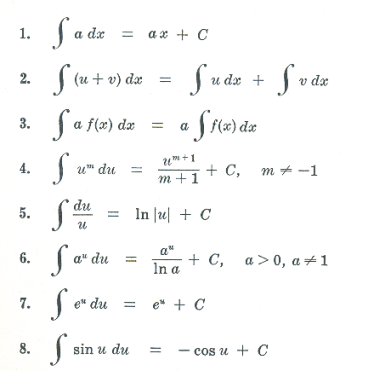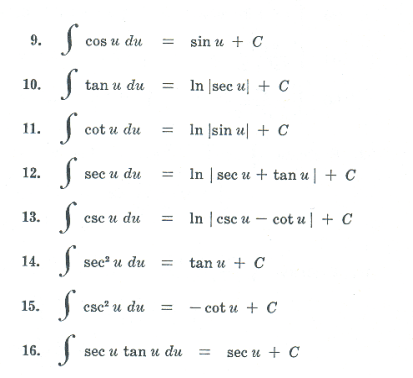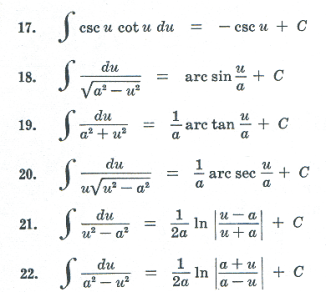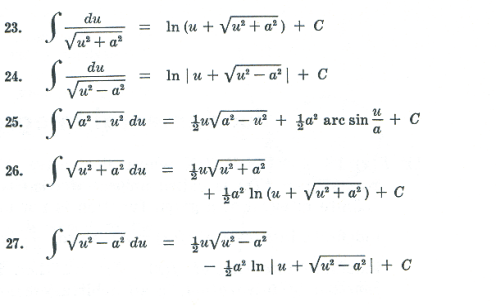Website owner: James Miller
INTEGRATION, INDEFINITE INTEGRAL, FUNDAMENTAL FORMULAS AND RULES
Def. Indefinite integral. The indefinite integral of a function f(x) is a function F(x) whose derivative is f(x). The indefinite integral of a function is the primitive of the function. The terms indefinite integral, integral, primitive, and anti-derivative all mean the same thing. They are used interchangeably. Of the four terms, the term most commonly used is integral, short for indefinite integral. If F(x) is an integral of f(x) then F(x) + C is also an integral of f(x), where C is any constant.
Def. Integrate (a function). To integrate a function is to go through the process of finding the integral or primitive of the function.
Notation used to denote integrals. The notation used to denote the integral (or primitive) of a function f(x) is
![]()
This notation may seem a bit illogical, cumbersome and confusing to a first-time reader and he may wonder why such a complicated notation would be used to denote the primitive F(x) of a function f(x). Surely a simple notation such as Λ f(x) could be used to denote a primitive of f(x). Why use such a abstruse, confusing, cumbersome notation? Well, there are reasons behind the notation.
It is a notation that follows logically if we assume we can use the usual algebraic rules in the manipulation of differentials in equation form. The notation follows as a logical consequence of the rules. For example, consider the following.
By the definition of an integral or primitive we have the following relationship between a function f(x) and its primitive F(x):
![]()
Then, using algebraic rules of manipulation,
![]()
Taking the integral of both sides,
![]()
or
![]()
Thus, using rules of algebraic manipulation, we have started with

and deduced that the primitive F(x) is given by
![]()
Thus this notation allows us to use algebraic manipulation in solving integration problems.
In addition, most integration problems come in the form of definite integrals of the form

and we work algebraically from that form. The source of the notation is undoubtedly the definite integral. It is the definite integral without the limits. Indeed, if you view the upper limit b of the definite integral 1) as variable, replace it with x, then it becomes the area function
![]()
and the area function A(x) does indeed represent a primitive of f(x).
Fundamental integration formulas. The following are the main formulas and rules for integration, the most important of which need to be memorized. Many follow immediately from the standard differentiation formulas. a and m are constants.




Def. Evaluate (an integral). To carry out the indicated integration, and if it is a definite integral, substitute the limits of integration.
The process of integration. The definition of the derivative carried with it a formal process by which one could find the derivative of a given function. Given any analytically defined function (algebraic, trigonometric, etc.) we can find the derivative of it through a fairly straightforward process. The situation with integration is different. There is no straightforward, direct process for integrating a function. The process goes like this: We are presented with an integral such as
![]()
to evaluate. To do it we ask ourselves, “What primitive has the differential f(x)dx?” We use our knowledge of memorized formulas and rules plus various techniques that we have learned plus perhaps integration tables to try to find a primitive, if one exists. There is no set procedure. Creativity and ingenuity are often needed. Typically we may do a lot of manipulating and experimenting. If we find a primitive F(x), then the integral is given as
![]()
where C is any constant.
If we are presented with a definite integral such as
![]()
to evaluate, then the solution will have the form
![]()
There is, however, no guarantee that a solution exists that is expressible in terms of elementary functions. For example, none of the functions
![]()
have primitives that can be expressed in terms of elementary functions. There is, for example, no
finite combination of elementary functions (i.e. algebraic, trigonometric, exponential, etc.) whose
derivative is
![]() .
.
Jesus Christ and His Teachings
Way of enlightenment, wisdom, and understanding
America, a corrupt, depraved, shameless country
On integrity and the lack of it
The test of a person's Christianity is what he is
Ninety five percent of the problems that most people have come from personal foolishness
Liberalism, socialism and the modern welfare state
The desire to harm, a motivation for conduct
On Self-sufficient Country Living, Homesteading
Topically Arranged Proverbs, Precepts, Quotations. Common Sayings. Poor Richard's Almanac.
Theory on the Formation of Character
People are like radio tuners --- they pick out and listen to one wavelength and ignore the rest
Cause of Character Traits --- According to Aristotle
We are what we eat --- living under the discipline of a diet
Avoiding problems and trouble in life
Role of habit in formation of character
Personal attributes of the true Christian
What determines a person's character?
Love of God and love of virtue are closely united
Intellectual disparities among people and the power in good habits
Tools of Satan. Tactics and Tricks used by the Devil.
The Natural Way -- The Unnatural Way
Wisdom, Reason and Virtue are closely related
Knowledge is one thing, wisdom is another
My views on Christianity in America
The most important thing in life is understanding
We are all examples --- for good or for bad
Television --- spiritual poison
The Prime Mover that decides "What We Are"
Where do our outlooks, attitudes and values come from?
Sin is serious business. The punishment for it is real. Hell is real.
Self-imposed discipline and regimentation
Achieving happiness in life --- a matter of the right strategies
Self-control, self-restraint, self-discipline basic to so much in life